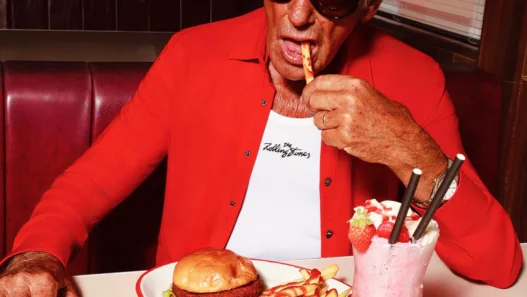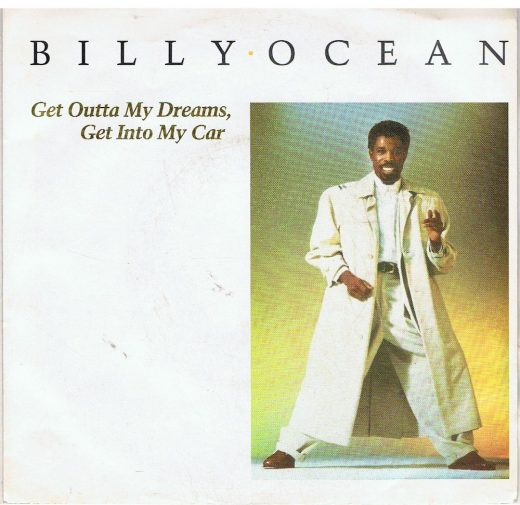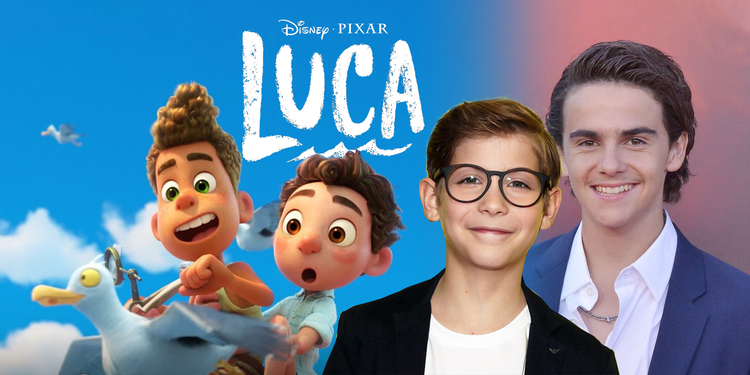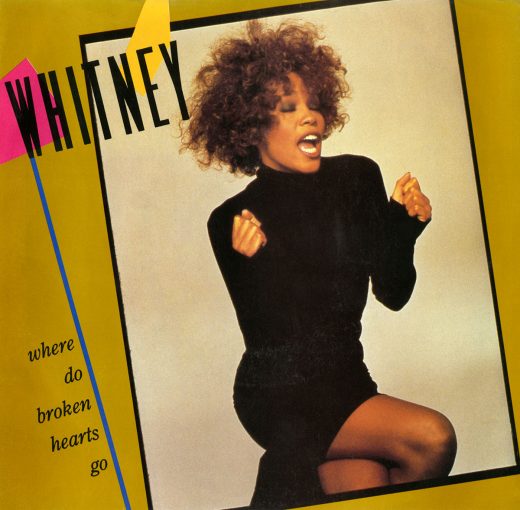From one of our preferred musical sources…
It’s all in the delivery. The phrase “get out of my dreams, get into my car” can be a playful if corny little pickup line, or it can be a weirdly intense threat. At the beginning of Billy Ocean’s “Get Outta My Dreams, Get Into My Car,” the British singer’s third and final #1 hit, Ocean veers dangerously close to the latter. That’s the bit where Ocean, his voice multitracked to sound like a mob, chants, “Hey! You! Get into my car!” That’s probably not something you ever want to hear a stranger yelling at you. If you hear that, there’s a good chance that you’re about to black out and then wake up chained to a radiator in somebody’s basement.
Within a few seconds, though, the song’s irrepressible silliness bubbles up, all honking saxophones and cascading drum-machine rattles. When Billy Ocean stops chanting and starts singing, he’s an exuberant scamp. Ocean’s lines on “Get Outta My Dreams” are all awkward and ungainly on paper: “Hey, Cinderella! Step in your shoe!” But Ocean howls them out with so much pleasure that his car sounds like a pretty fun place to be. Of Ocean’s three #1 hits, “Get Outta My Dreams” is the catchiest and liveliest — a bright-plastic pop-music time capsule that still bursts with goofy energy.
Billy Ocean himself should get plenty of credit for that goofy energy. Ocean never had much of a pop-star persona, and “Get Outta My Dreams, Get Into My Car” isn’t a terribly distinct song. It’s easy to imagine someone like Huey Lewis singing “Get Outta My Dreams,” if he’d really bothered to venture into late-’80s dance-pop. But almost any other singer would’ve delivered the song with too much of a self-aware wink-nudge. Ocean just belts the damn thing out. Ocean doesn’t sound like a pickup artist in love with his own cleverness. Instead, he sounds supremely excited at the possibility that someone is about to get into his car.
But a lot of the credit should also go to Robert John “Mutt” Lange, the man who produced “Get Outta My Dreams, Get Into My Car” and who co-wrote the song with Billy Ocean. “Get Outta My Dreams” was Lange’s first #1 hit, but he was already a pop-music veteran by the time he helped Billy Ocean stage his final pop-chart takeover. By that time, Lange was known as maybe the world’s greatest arena rock producer, and Billy Ocean is nobody’s idea of an arena rock singer. But Lange and Ocean made sense together anyway, since Lange’s dizzily maximalist all-hooks sensibility never truly belonged to any particular genre.
We got into Mutt Lange a little bit in the Number Ones Bonus Tracks column on Foreigner’s “Waiting For A Girl Like You,” the 1981 single that spent a near eternity stuck at #2. Lange co-produced that song, and he helped supercharge Foreigner’s already-slick sound by bringing in a very young Thomas Dolby to play keyboards. That’s the kind of thing that Mutt Lange was always great at doing: Taking big, obvious things and making them bigger and more obvious.
Lange, born in Zambia, grew up privileged in apartheid-era South Africa, and he started playing in bands in the late ’60s, after he’d served out his compulsory military service. In the early ’70s, Lange started a psych-rock band called Hocus, and he married singer Stevie Vann. In the mid-’70s, Lange and Vann moved to the UK together and split up soon afterward. (This would not be Lange’s last time marrying and divorcing a musical collaborator.) Lange launched his producing career when he was about 30, and at first, he mostly worked with pub-rock acts that were starting to mutate into new wave acts: Graham Parker, the Motors, Huey Lewis’ old band Clover. In 1978, the Boomtown Rats had a UK chart-topper with the Lange-produced single “Rat Trap.” But Lange’s real breakthrough came when he produced the Australian hard rock band AC/DC’s 1979 smash Highway To Hell.
For Highway To Hell, Lange helped AC/DC streamline and focus their well-established sound, giving their crunch a heft that it had never had. The album broke AC/DC in the US and sold millions, but frontman Bon Scott drank himself to death shortly after its release. After Scott’s death, AC/DC recruited Brian Johnson, an English singer who could screech just like Scott, and they recorded the 1980 album Back In Black with Lange. Back In Black sold in ridiculous, jaw-dropping numbers, and it remains one of the biggest-selling albums in the history of the world. The single “You Shook Me All Night Long” peaked at #35 on the Hot 100, a rare feat in a climate where hard rock simply didn’t do business on the charts. From there, Mutt Lange was made.
In the years after Back In Black, Lange worked with Foreigner on 4 and with the Cars on Heartbeat City, two hugely successful records. Lange also took the Sheffield hard rock band Def Leppard under his wing, producing their albums High ‘N’ Dry and Pyromania. With Lange, Def Leppard discovered towering production and gleaming hooks, and they became stars. (Leppard will appear in this column soon.) But not all of Lange’s success was in the arena-rock, um, arena. Lange also knew how to put together a pop song. Huey Lewis And The News, for instance, scored their first top-10 hit with the Lange-written 1982 single “Do You Believe In Love.” (That one peaked at #7. It’s a 5.)
In 1984, Billy Ocean vaulted out of obscurity, reaching #1 with the breakout hit “Caribbean Queen (No More Love On The Run).” Ocean’s follow-up single was a supremely catchy quasi-rock jam called “Loverboy.” Billy Ocean and his regular collaborator Keith Diamond co-wrote that one with Mutt Lange, and Diamond and Lange produced it together. “Loverboy” is basically an arena-rock song; with minor adjustments, it could’ve been a hit for Def Leppard or the Cars. But Billy Ocean sang the hell out of it, and the song landed right in that post-“Beat It” zone where a Black pop singer could sing a straight-up rock song and turn it into a smash. (This was a sadly short-lived phenomenon, as white rock stations were loathe to play anything from Black pop singers.) But timing is everything. “Loverboy” showed up at the right time, and it peaked at #2. (It’s an 8.) Lange also had a hand in writing “When The Going Gets Tough, The Tough Get Going,” Billy Ocean’s contribution to the soundtrack of the 1985 movie The Jewel Of The Nile, and that one also peaked at #2. (It’s a 6.)
By 1988, Billy Ocean was riding an improbable hit streak. After nearly a decade as a total unknown in America, Ocean knocked out six top-10 hits in two years. Two of them — weirdly, the two with eight-word song titles — made it all the way to #1. When Ocean went to work on his 1988 album Tear Down These Walls, Ocean naturally got together with Mutt Lange for another song with an eight-word title. I wonder if Ocean noticed the pattern, if he used “Outta” instead of “Out Of” on the “Get Outta My Dreams” title so that he’d hit that exact word count. (“When The Going Gets Tough, The Tough Get Going” has a nine-word title, so maybe that’s why it didn’t reach #1.)
Tear Down These Walls, which took its title from the famous speech that Ronald Reagan gave at the Berlin Wall the previous year, is a fascinating album, though it’s not a particularly good one. Ocean released the LP a couple of days before his 38th birthday, and it finds him trying to catch up with the sounds of the moment. Ocean co-wrote the title track, for instance, with Mutt Lange and new jack swing auteur Teddy Riley, a man whose work will soon appear in this column. I’m pretty sure that one song is the only time Lange and Riley ever worked together, and I wish we had more. It’s fun just to imagine the two of them in the studio together, trying to find middle ground. (They did a pretty good job, honestly. “Tear Down These Walls” is a cool song. It didn’t make the Hot 100, but it did reach #27 on the R&B chart.)
Where Billy Ocean’s two previous albums had both gone double platinum, Tear Down These Walls only went platinum once, and “Get Outta My Dreams” was its only top-10 hit. But man, that’s a hit! Once you know “Get Outta My Dreams” is a Mutt Lange production, you can’t unhear it. Unlike “Loverboy,” “Get Outta My Dreams” doesn’t really sound like arena-rock, but it still floods your pleasure centers the same way a Def Leppard track might do. The production is vast and layered, and it’s lousy with hooks.
The “Get Outta My Dreams” intro has jackhammering drum machines and car-horn beeps and heavy breathing, which makes the “Hey! You!” bit a little bit creepier. (Ocean later said that label execs got him to “cut out some of the grunts and groans” from that opening: “Part of the problem they foresaw was it could encourage perverts to molest little children.” That seems like a stretch to me, but I guess it’s good to stay on the safe side there.) Other than the old-school honk-bleat sax solo, almost everything on “Get Outta My Dreams” is synthetic, and yet the song never seems tinny or chintzy. Instead, those programmed drums knock you around from all sides, and Ocean and Lange build these great playful melodies on top of them.
Lyrically, “Get Outta My Dreams” is a mess. The song got its title and its concept from Johnny Burnette’s 1960 rockabilly hit “You’re Sixteen,” a much-creepier song that Ringo Starr took to #1 in 1973. (That song might actually encourage perverts to molest little children, now that I think about it.) On “You’re Sixteen,” the line is “you walked out of my dreams and into my arms.” Billy Ocean’s lyrical adjustment might make “Get Outta My Dreams” a little more threatening, but it also allows for more car-horn sound effects, which is a good thing. (The song also borrows its toot-toot beep-beeps from the Beatles “Drive My Car.”) As a song about cars, “Get Outta My Dreams” also gives Ocean a chance to sing some truly delirious nonsense: “Smooth operator, touch my bumper!”
That ridiculousness works. “Get Outta My Dreams, Get Into My Car” is a pure, euphoric vision of pop absurdity. If you think too hard about the song, it feels like the stupidest, most vapid thing imaginable. If you start asking questions, more questions will appear. (For instance, when Ocean sings, “Get it while you can, I’ll be your nonstop miracle,” what could that possibly mean? If he’s really a nonstop miracle, why would there be an expiration date on his offer?) But when the song is playing, it moves. Charisma just bursts out of this thing. When the key change kicks in, Lange gives it a rushing whoosh, like a train entering a station, and that is my shit.
The “Get Outta My Dreams” video only reinforces that feeling of giddy silliness. Director Terry Bulley, who would go on to make a 1997 Cliff Richard TV movie called Heathcliff, spins a story of Billy Ocean picking up a car-wash attendant and taking her to a drive-in movie. In the movie they go see, Billy Ocean dances with a sax-playing cartoon duck. In the year of Who Framed Roger Rabbit, the clip’s combination of animation and live action isn’t very sophisticated, but it’s still fun to see a goldfish inexplicably swimming around Billy Ocean’s flooded car, or a gas station’s pumps transforming into backup singers. Also, I like how the girl in the video lip-syncs all the chanting parts, implying that her voice is a whole lot deeper than one might imagine.
Billy Ocean’s Tear Down These Walls album came out in January of 1988, shortly after Def Leppard released their Mutt Lange-produced blockbuster Hysteria. (Hysteria‘s title track peaked at #10 a week before “Get Outta My Dreams” reached #1. It’s a 9.) “Get Outta My Dreams” turned out to be Billy Ocean’s final top-10 hit. Ocean’s follow-up, the ballad “The Colour Of Love,” peaked at #17. A year later, Ocean released a greatest-hits album with a straight-up new jack swing single called “License To Chill,” which Ocean and Lange co-wrote and which peaked at #32. That was the last Billy Ocean song to chart on the Hot 100.
After Tear Down These Walls, Ocean waited five years to release his next album. Ocean recorded some of the smoothed-out 1993 R&B LP Time To Move On in Chicago with R. Kelly, a man who will unfortunately show up in this column. Time To Move On was Ocean’s last album for Jive Records, the label that he’d helped establish. It seems like Ocean mostly retired after that one. He didn’t release another album for 16 years. These days, Ocean collects occasional lifetime-achievement awards and records when he feels like it. He released an album called One World last year.
It’s fun to see Billy Ocean pop up every once in a while these days, but he doesn’t seem too concerned with burnishing his legacy. He struggled for a long time, then went on a hot streak. Now, as a result, Billy Ocean gets to live out the rest of his days in comfort. That seems like a great life.
Mutt Lange also seems to be more or less retired these days, and he’s presumably got enough money that he could buy everyone reading this column a brand-new luxury automobile without ever adjusting his way of life the tiniest bit. (He probably won’t do that, though.) Mutt Lange’s work will appear in this column again.
GRADE: 8/10 Stereogum.com


















